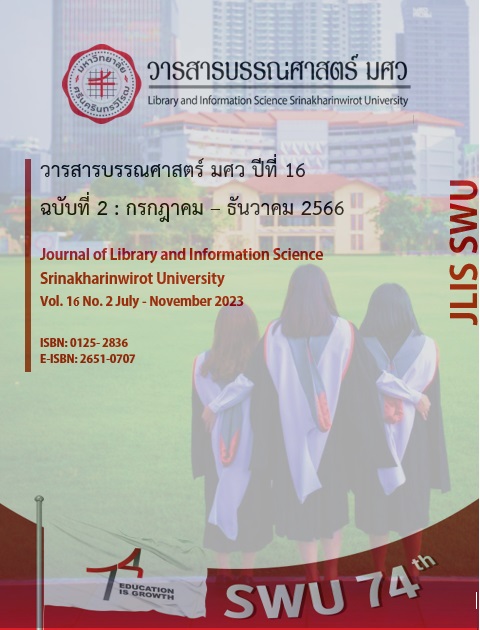กลยุทธ์การบริหารวิชาการตามแนวคิกระบวนการคิดเชิงออกแบบเพื่อการพัฒนาอย่างยั่งยืนสังกัดสำนักงานเขตพื้นที่การศึกษาประถมศึกษานครราชสีมา เขต 4
คำสำคัญ:
การคิดเชิงออกแบบ, การพัฒนาอย่างยั่งยืน, การบริหารวิชาการบทคัดย่อ
วัตถุประสงค์เพื่อนำเสนอกลยุทธ์การบริหารวิชาการตามแนวคิกระบวนการคิดเชิงออกแบบเพื่อการพัฒนาอย่างยั่งยืน โดยใช้วิธีการวิจัยเชิงปริมาณ ตัวอย่างในการวิจัย คือ โรงเรียนในสังกัดสำนักงานเขตพื้นที่การศึกษาประถมศึกษานครราชสีมา เขต 4 จำนวน 124 โรงเรียน ผู้ให้ข้อมูล ได้แก่ ผู้อำนวยการ รองผู้อำนวยการโรงเรียนฝ่ายวิชาการ ครูระดับประถมศึกษาตอนต้น และครูระดับประถมศึกษาตอนปลายรวมทั้งสิ้น 496 คน โดยมีผู้ตอบแบบสอบถาม จำนวน 412 คน คิดเป็น 83.06% สถิติที่ใช้ได้แก่ ความถี่ ร้อยละ ค่าเฉลี่ย ส่วนเบี่ยงเบนมาตรฐานและค่าดัชนีความต้องการจำเป็นแบบปรับปรุง และการวิเคราะห์เนื้อหา
จากการศึกษาสภาพปัจจุบันมีค่าเฉลี่ยอยู่ในระดับ มาก ( = 3.831 SD. 0.738) และระดับที่พึงประสงค์ ระดับมาก ( = 4.350 SD. 0.839) และความต้องการจำเป็น พบว่า การพัฒนาหลักสูตร และการพัฒนาสื่อ นวัตกรรม เทคโนโลยีเพื่อการศึกษาและแหล่งเรียนรู้อยู่ในกลุ่มสูงซึ่งเป็นจุดอ่อน (PNImodified = .147) และการวัดประเมินผลอยู่ในกลุ่มสูงซึ่งเป็นจุดอ่อน (PNImodified = .141) และปัจจัยภายนอก สภาพเทคโนโลยีอยู่ในกลุ่มสูงซึ่งเป็นจุดอ่อน (PNImodified = .147) การพัฒนาสื่อ นวัตกรรม เทคโนโลยีเพื่อการศึกษา และแหล่งเรียนรู้ อยู่ในกลุ่มสูงซึ่งเป็นจุดอ่อน (PNImodified = .184) ในการวิจัยและนำมากำหนดกลยุทธ์นำเสนอกลยุทธ์การบริหารวิชาการตามแนวคิกระบวนการคิดเชิงออกแบบเพื่อการพัฒนาอย่างยั่งยืน ได้แก่ 3 กลยุทธ์หลัก ดังนี้ 1) พัฒนาหลักสูตรสถานศึกษาที่เน้นกระบวนการคิดเชิงออกแบบที่เสริมสร้างทักษะความสามารถของผู้เรียน 2) พัฒนาสื่อ นวัตกรรม เทคโนโลยีเพื่อการศึกษา และแหล่งเรียนรู้ที่เน้นกระบวนคิดเชิงออกแบบที่เสริมสร้างทักษะความสามารถของผู้เรียน กลยุทธ์รอง 3) พัฒนากระบวนการวัดและประเมินผลที่เน้นกระบวนคิดเชิงออกแบบที่เสริมสร้างทักษะความสามารถของผู้เรียน
เอกสารอ้างอิง
Bennett, A. G., & Cassim, F. (2017). How Design Education Can Use Generative Play to Innovate for Social Change: A Case Study on the Design of South African Children’s Health Education Toolkits. 11(2).
Chamchoy, S. (2012). Concept of Innovation for School Management in the 21st Century. Journal of Education Naresuan University, Faculty of Education, Naresuan University, 14(2), 117-128.
Department of Economic and Social Affairs. (2023). Sustainable Development Goals: SDGs 2030. http://tdri.or.th/wpcontent/uploads/2014/06/wb103.pdf [16 August 2023].
Dechakupt, P. and Yindeesuk, P. (2017). 7Cs Skills of Teachers 4.0. Bangkok: Chulalongkorn University Press.
Khamthana, P. (2563). A Handbook for Design thinking Curriculum for promoting Innovation Competency of Nursing Students, Boromarajonani College of Nursing, Ratchaburi. Bangkok: Charansanitwong Printing Co.,Ltd.
Jimatong, N. and Wibooncharoensuk, P. (2023). Teaching with Using Design Thinking for Primary Grade Students. Thai Journal Citation Index Center, 8(4).
Li & Zhan, 2022 Li, T., & Zhan, Z. (2022). A Systematic Review on Design Thinking Integrated Learning in K-12 Education. Applied Sciences, 12(16), 8077. https://doi.org/10.3390/app12168077
Liangcheepchop, P. (2018). Academic Management Strategies of Primary Schools based on the Concept of Thais 4.0. Chulalongkorn University, Faculty of Education.
Luka, I. (2020). Design Thinking in Pedagogy. Journal of Education Culture and Society, 5(2), 63–74. https://doi.org/10.15503/jecs20142.63.74
Malekzai, Z. (2023). Design Thinking for Creativity and Innovation at Schools. Program Master of Arts in education: https://pressbooks.pub/
Mandi D. (2023). Makers Empire: https://creativespacessummit.com/Speaker/mandi-dimitriadis/
Ministry of Education. (2000). Interested Article, Research Indicating Students with Good Marks Having Lower Analytical thinking Skills-Public Mind, https://www.moe.go.th/
Ministry of Education. (2000). Policy and Main Emphasis of the Ministry of Education, Fiscal Year 2000. https://www.bkkedu.in.th/
Nakhonratchasima Primary Educational Service Area Office 4. (2023), https://www.korat4.go.th/
Office of the Permanent Secretary for Education. (2020). Strategic Plan of the Ministry of Education (2020 –2022). (n.d.)
Office of the National Economic and Social Development Board. (2018). 20-Year National Strategy (2017-2036).
Puarungroj, W. et.al., (2017). Trends in Modern Teaching and Learning Methods using. Online Formative Assessment Tools. Walailak Journal of Learning Innovations, 3(2), 45-68.
Rusmann, A., & Ejsing-Duun, S. (2022). When Design Thinking Goes to School: A Literature Review of Design Competences for the K-12 Level. International Journal of Technology and Design Education, 32(4), 2063 - 2091. https://doi.org/10.1007/s10798-021-09692-4
Rengubtook, W. (2020). Thai Learners’ Key Competencies in a VUCA World. Journal of Teacher Professional Development, 1(1), pp. 8-11.
Rungruanphon, W., Wattanasuwan, K. and Teerakapiban. S. (2019). Revising the Curriculum and Teaching Style to Prepare Marketers for the Thailand 4.0 Era. Journal of Multidisciplinary Academic Research and Development, 1(1), 2019: 1-27.
Thailand Development Research Institute. (2014). Formulation of Strategies for Basic Education Reform with Accountability. Retrieved from:World Economic Forum (WEF) 2019. https://www3.weforum.org/docs/WEF_TheGlobalCompetitivenessReport2019.pdf
ไฟล์ประกอบ
เผยแพร่แล้ว
ฉบับ
ประเภทบทความ
สัญญาอนุญาต
ลิขสิทธิ์ (c) 2023 คณะมนุษยศาสตร์ มหาวิทยาลัยศรีนครินทรวิโรฒ

อนุญาตภายใต้เงื่อนไข Creative Commons Attribution-NonCommercial-NoDerivatives 4.0 International License.
เกี่ยวกับลิขสิทธิ์
ลิขสิทธิ์ของบทความที่ปรากฏในวารสารบรรณศาสตร์ มศว เป็นของผู้นิพนธ์และคณะมนุษยศาสตร์ มหาวิทยาลัยศรีนครินทรวิโรฒ ทั้งนี้ บทความทุกเรื่องผ่านการตรวจสอบความถูกต้องทางวิชาการจากผู้ทรงคุณวุฒิ ข้อความและข้อมูลของบทความในวารสารฯ เป็นแนวคิดของผู้นิพนธ์ มิใช่เป็นความคิดเห็นของกองบรรณาธิการและมิใช่ความรับผิดชอบของคณะมนุษยศาสตร์ มหาวิทยาลัยศรีนครินทรวิโรฒ ไม่สงวนลิขสิทธิ์การนำไปใช้ประโยชน์ทางวิชาการ แต่ต้องอ้างอิงแสดงแหล่งที่มาและที่อยู่ในขอบเขตของกฎหมายลิขสิทธิ์



